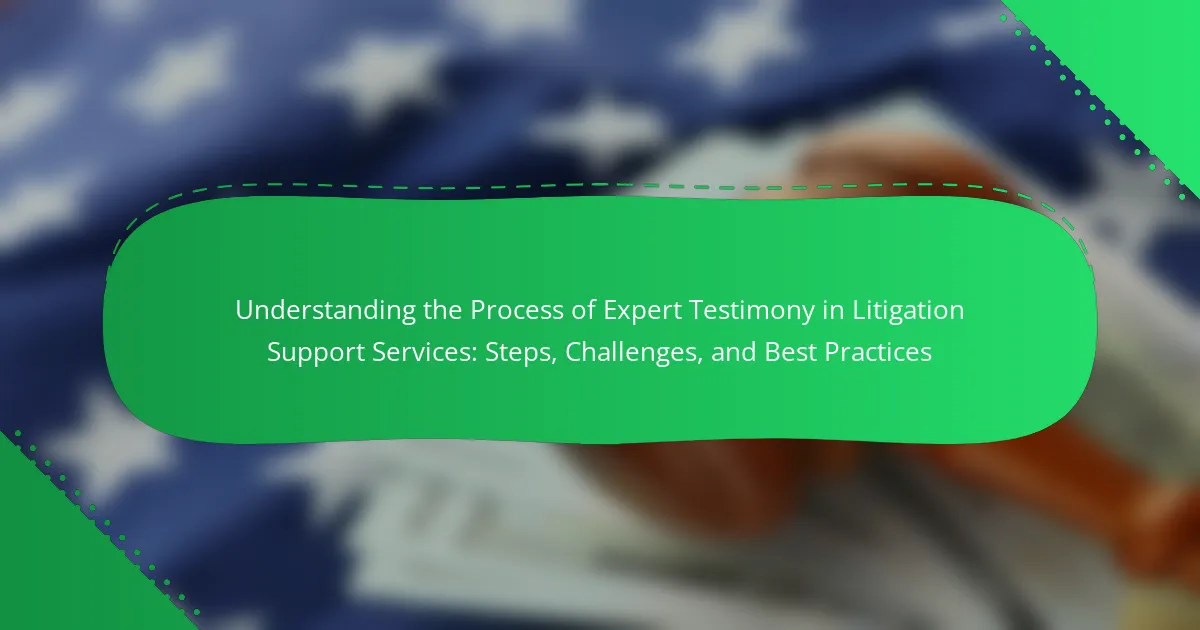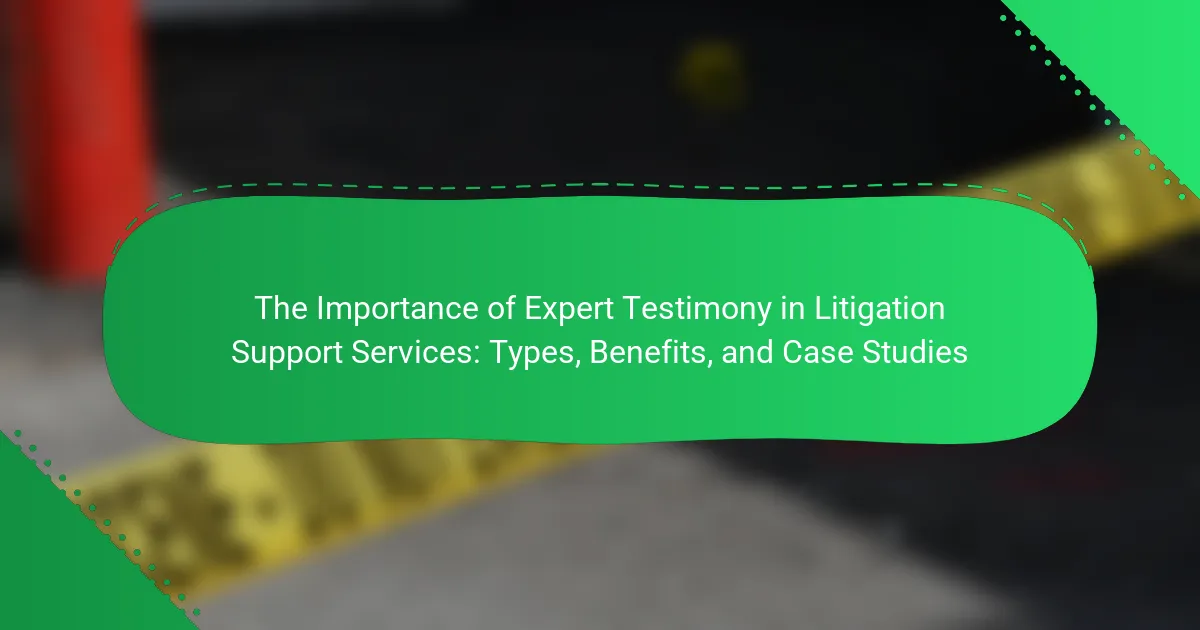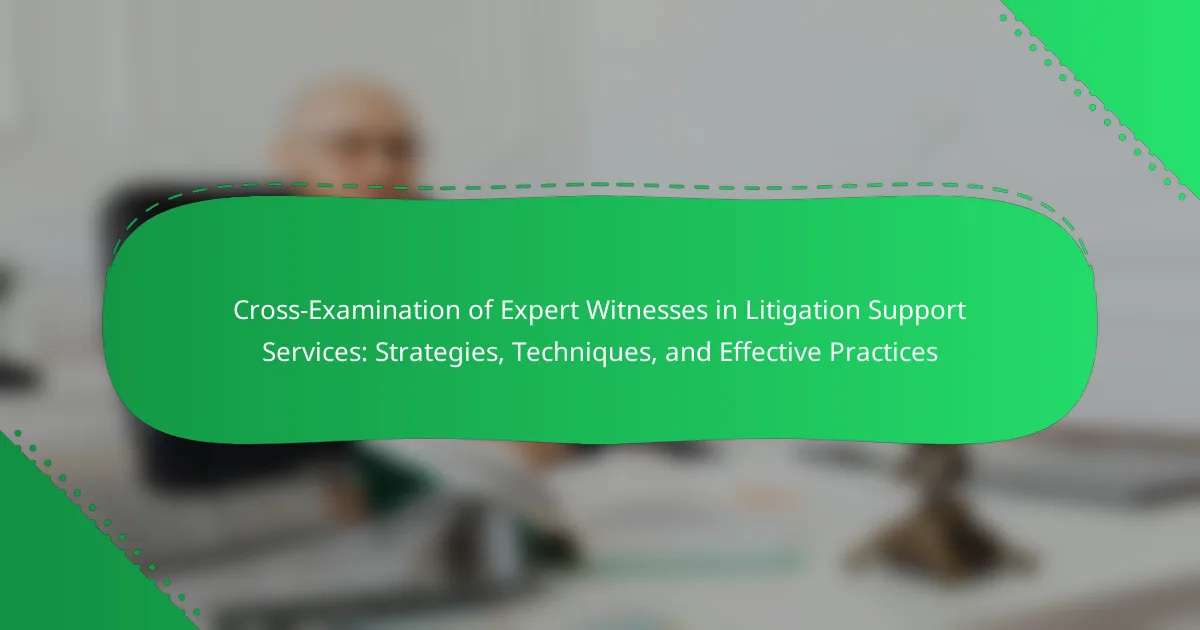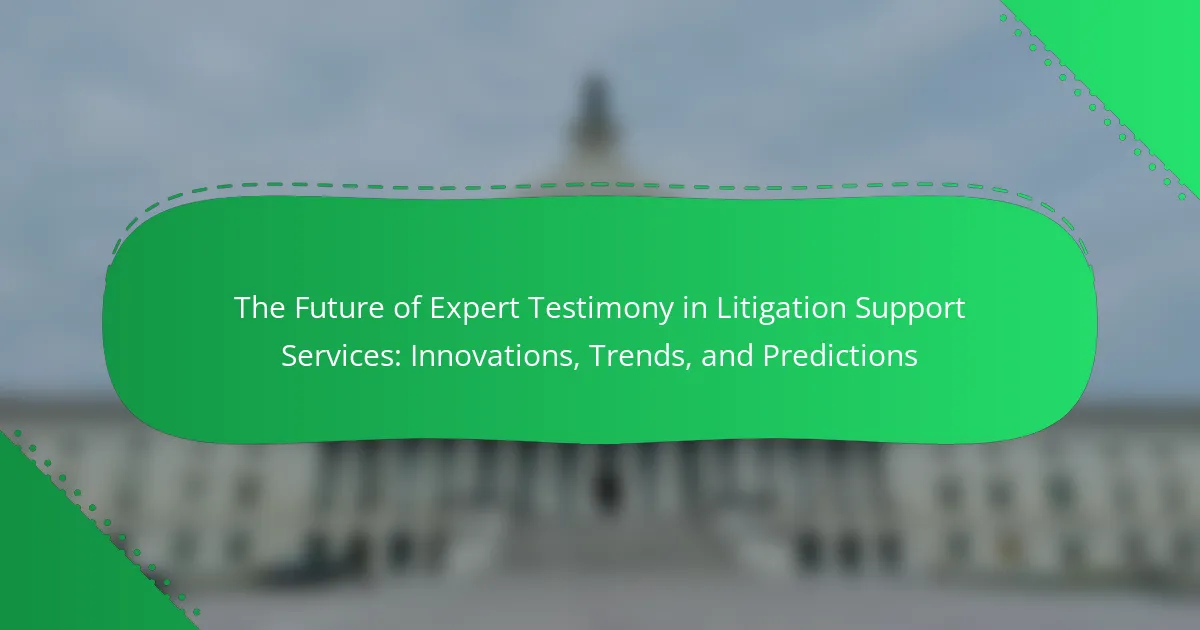Expert testimony is a critical component of litigation support services, involving a structured process that ensures expert opinions are effectively integrated into legal proceedings. The process begins with the selection of an expert based on their qualifications and relevance to the case, followed by a thorough review of case materials to grasp the context. Experts then prepare detailed reports outlining their findings, which are submitted to the court and shared with opposing counsel. Subsequent steps include depositions where experts answer questions under oath, and ultimately, presenting their testimony during trial. This article provides an overview of the steps involved, the challenges faced by experts, and best practices for delivering effective testimony within the legal framework.
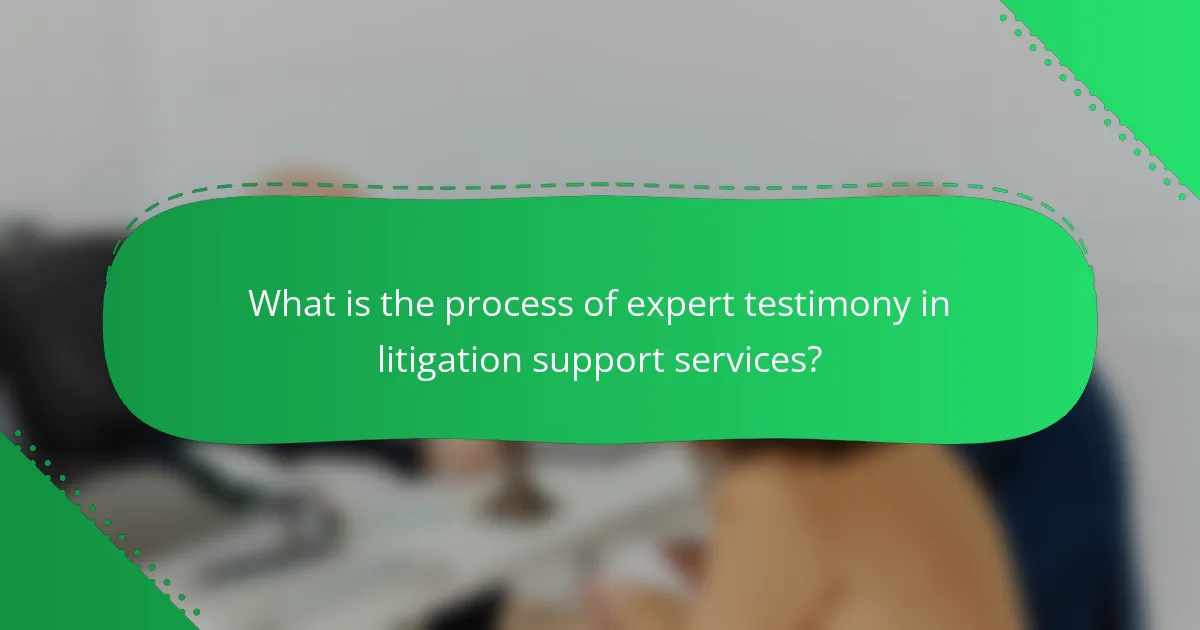
What is the process of expert testimony in litigation support services?
The process of expert testimony in litigation support services involves several key steps. First, an expert is selected based on their qualifications and relevance to the case. Next, the expert reviews case materials to understand the context and issues involved. Following this, the expert prepares a report outlining their findings and opinions. The report is often submitted to the court and shared with opposing counsel.
Subsequently, the expert may be deposed, where they answer questions under oath regarding their report and methodology. This deposition can be used during trial to challenge the expert’s credibility or conclusions. Finally, during the trial, the expert presents their testimony, explaining their findings to the judge or jury. This process ensures that expert opinions are evaluated and understood within the legal framework.
How does expert testimony contribute to legal proceedings?
Expert testimony contributes to legal proceedings by providing specialized knowledge that aids in understanding complex issues. Experts analyze evidence and offer opinions based on their expertise. This testimony can clarify technical details for judges and juries. It helps establish facts that may be outside the general knowledge of the court. Courts often rely on expert testimony to assess the credibility of evidence. For instance, in medical malpractice cases, a medical expert can explain standards of care. This explanation is crucial for determining negligence. Additionally, expert testimony can influence case outcomes by swaying jury opinions. In a study by the National Academy of Sciences, expert testimony was found to significantly impact jury decisions in 75% of cases.
What are the key roles of an expert witness in litigation?
An expert witness in litigation serves multiple key roles. They provide specialized knowledge on technical subjects. This expertise aids the court in understanding complex information. They often prepare reports summarizing their findings. These reports can significantly influence case outcomes. Expert witnesses also testify in court to present their opinions. Their testimony must be based on reliable methods and principles. They may assist attorneys in formulating strategies based on their insights. Overall, expert witnesses bridge the gap between technical subjects and legal proceedings.
How does expert testimony differ from other forms of evidence?
Expert testimony differs from other forms of evidence by providing specialized knowledge. It is presented by individuals with expertise in a specific field. This testimony aids in understanding complex issues that laypersons may find difficult. Unlike regular evidence, expert testimony is based on scientific, technical, or professional principles. Courts often rely on this type of evidence to clarify intricate matters. For example, in a medical malpractice case, a doctor may testify about standard care practices. This specialized insight is crucial for informed decision-making in legal proceedings.
What are the steps involved in preparing for expert testimony?
The steps involved in preparing for expert testimony include reviewing relevant materials, understanding the case details, and identifying key issues. Experts should gather documents, evidence, and reports pertinent to the case. They must also clarify their role and the specific questions they need to address. Next, experts should formulate their opinions based on the evidence and prepare to articulate them clearly. Practicing testimony through mock sessions can help in refining delivery. Finally, experts should stay updated on any changes in the case until the testimony date. These steps ensure that the expert is well-prepared and credible during the testimony.
What initial assessments are necessary before providing expert testimony?
Initial assessments necessary before providing expert testimony include evaluating qualifications and expertise. Experts must assess their own educational background and professional experience relevant to the case. They should also review the specifics of the case to determine its alignment with their expertise. A thorough analysis of the evidence and facts is essential. This helps ensure that the expert can provide informed opinions. Additionally, experts must consider potential biases that could affect their testimony. Understanding the legal standards for admissibility of expert testimony is also crucial. These assessments help establish credibility and reliability in the courtroom.
How should an expert witness gather and analyze relevant information?
An expert witness should gather and analyze relevant information systematically. First, they must identify the specific questions or issues at hand. This involves understanding the legal context and the facts of the case. Next, they should collect data from credible sources. These sources can include academic journals, industry reports, and case law.
Once the data is collected, the expert should evaluate its reliability and relevance. This evaluation helps ensure that the information aligns with the case requirements. After assessment, the expert should analyze the data critically. This analysis involves interpreting the data and drawing conclusions based on evidence.
It’s essential for the expert witness to document their findings thoroughly. This documentation provides a clear trail of their research and analysis process. Finally, the expert should be prepared to present their findings in a clear and concise manner. This ensures that their testimony is understandable and credible in court.
What challenges do expert witnesses face during the litigation process?
Expert witnesses face several challenges during the litigation process. One major challenge is maintaining objectivity while under pressure from legal teams. They must provide unbiased opinions based on facts, despite potential influences from either party. Another challenge is the complexity of legal jargon and procedures. Expert witnesses often need to navigate intricate legal frameworks that can be unfamiliar. Additionally, they may face scrutiny during cross-examination, where their credibility and qualifications are questioned. This can lead to increased stress and the need for thorough preparation. Furthermore, expert witnesses must effectively communicate complex information to a lay audience, such as jurors. This requires distilling technical details into understandable terms, which can be difficult. Lastly, time constraints can pressure expert witnesses to deliver their analysis quickly, potentially affecting the quality of their testimony.
How can biases affect the effectiveness of expert testimony?
Biases can significantly undermine the effectiveness of expert testimony. They may lead experts to present skewed interpretations of data. This can distort the facts and mislead the court. Cognitive biases, such as confirmation bias, can cause experts to favor information that supports their pre-existing beliefs. Emotional biases can affect an expert’s objectivity, leading to biased conclusions. Research shows that biased expert testimony can influence jury decisions. A study by the National Center for State Courts found that jurors often rely heavily on expert testimony. Therefore, biases can compromise the integrity of the judicial process.
What legal and ethical dilemmas might arise for expert witnesses?
Expert witnesses may face legal and ethical dilemmas such as conflicts of interest, bias, and the obligation to provide truthful testimony. Conflicts of interest arise when an expert has a financial or personal stake in the case outcome. This can compromise their objectivity. Bias can occur if an expert has preconceived notions that influence their opinions. Experts must remain impartial to maintain credibility. They also have a legal obligation to provide honest and accurate information. Failing to do so can lead to legal repercussions, including sanctions or disqualification. Additionally, ethical standards require experts to disclose any potential conflicts. This transparency is essential for upholding the integrity of the judicial process.
How can expert witnesses improve their testimony effectiveness?
Expert witnesses can improve their testimony effectiveness by enhancing clarity and credibility. They should use straightforward language to explain complex concepts. This approach ensures that juries and judges understand their points. Preparation is crucial; expert witnesses must thoroughly review case materials. They should anticipate cross-examination questions and prepare clear responses. Building a rapport with the attorney can also enhance communication. Visual aids can help convey information more effectively. Research shows that clear and credible testimonies significantly influence case outcomes. A study by the American Psychological Association indicates that jurors are more persuaded by expert witnesses who present information clearly and confidently.
What best practices should be followed in preparing for court appearances?
To prepare for court appearances, individuals should follow several best practices. First, they must understand the case details thoroughly. This includes reviewing relevant documents and evidence. Next, individuals should practice their testimony. Rehearsing responses helps build confidence and clarity. Dressing appropriately is also essential; professional attire conveys respect for the court. Additionally, arriving early allows time to settle in and reduce anxiety. Maintaining composure during proceedings is crucial; staying calm helps in delivering clear and effective testimony. Lastly, consulting with legal counsel before the appearance ensures all aspects are covered. These practices enhance the likelihood of a successful court appearance.
How can expert witnesses enhance their communication skills for clarity?
Expert witnesses can enhance their communication skills for clarity by practicing concise language. Using simple terms helps convey complex ideas effectively. They should also focus on their audience’s understanding level. Tailoring messages to the audience improves comprehension. Engaging in active listening fosters better interactions. This allows expert witnesses to respond appropriately to questions. Additionally, utilizing visual aids can clarify complex information. Studies show that visuals increase retention and understanding by up to 65%. Regular training in public speaking can further refine their delivery. Overall, these strategies collectively improve clarity in communication.
What common pitfalls should expert witnesses avoid?
Expert witnesses should avoid several common pitfalls to maintain credibility. One major pitfall is failing to understand the legal standards relevant to their testimony. This can lead to inappropriate or irrelevant opinions being presented in court. Another pitfall is lack of preparation, which can result in unclear or unconvincing testimony. Experts must also avoid overstepping their expertise. Providing opinions outside their area of knowledge can undermine their credibility. Additionally, expert witnesses should steer clear of biased opinions. Objectivity is crucial in maintaining trust with the court. Failing to communicate effectively is another common mistake. Experts must articulate their findings clearly to be understood by judges and juries. Lastly, neglecting to stay updated on relevant developments in their field can also be detrimental. Continuous education ensures their testimony is based on the latest information.
What are the consequences of inadequate preparation for expert testimony?
Inadequate preparation for expert testimony can lead to significant negative consequences. These include diminished credibility of the expert witness. A lack of thorough understanding of the case can result in inaccurate or incomplete testimony. This may confuse the court or jury. Additionally, it can lead to ineffective communication of complex information. Poor preparation may also increase the likelihood of being challenged by opposing counsel. Such challenges can undermine the expert’s authority and impact the case outcome. Ultimately, inadequate preparation can weaken the overall case strategy and diminish the chances of a favorable verdict.
How can miscommunication impact the perception of expert testimony?
Miscommunication can significantly distort the perception of expert testimony. It may lead to misunderstandings of the expert’s qualifications or the relevance of their findings. When experts fail to communicate clearly, their credibility can be questioned. This skepticism can arise from ambiguous language or technical jargon that confuses the audience. A study by the American Psychological Association found that clear communication enhances the perceived credibility of expert witnesses. Additionally, miscommunication can result in selective interpretation of testimony, where key points are overlooked. Such misinterpretations can ultimately affect case outcomes by undermining the expert’s intended message.
What strategies can be employed to ensure successful expert testimony?
To ensure successful expert testimony, experts should focus on clear communication and thorough preparation. This involves understanding the case details and the specific questions they will face. Experts should simplify complex concepts into layman’s terms. They must also anticipate cross-examination questions and prepare concise, factual responses. Practicing testimony in mock trials can enhance delivery and confidence. Maintaining professionalism and composure during testimony is crucial. Experts should support their statements with credible evidence and relevant experience. A study by the American Psychological Association highlights that clarity and confidence significantly impact the effectiveness of expert testimony.
What role does ongoing education play in maintaining expertise?
Ongoing education is essential for maintaining expertise in any field, including litigation support services. It ensures professionals stay updated with the latest developments, methodologies, and legal standards. Continuous learning helps experts refine their skills and adapt to changing environments. Regular training can enhance critical thinking and analytical abilities, which are vital for effective testimony. Moreover, ongoing education fosters networking opportunities that can lead to collaborations and knowledge sharing. Research indicates that professionals who engage in lifelong learning tend to perform better and provide more accurate insights. For example, a study published in the Journal of Legal Studies found that experts who participated in ongoing training demonstrated a 30% increase in the accuracy of their testimony.
How can networking with legal professionals enhance an expert’s credibility?
Networking with legal professionals enhances an expert’s credibility by establishing trust and recognition within the legal community. When experts connect with attorneys, judges, and other legal practitioners, they gain visibility. This visibility can lead to referrals and recommendations, which are crucial for building a reputation.
Moreover, engaging with legal professionals allows experts to stay informed about industry standards and expectations. This knowledge positions them as informed authorities in their field. Experts who are recognized by legal professionals are often seen as more reliable and competent.
Research indicates that credibility is significantly influenced by social connections in professional settings. A study published in the Journal of Legal Studies found that expert witnesses with strong legal networks had a higher success rate in court. This underscores the importance of networking for enhancing credibility.
What are the best practices for delivering expert testimony in court?
The best practices for delivering expert testimony in court include thorough preparation, clarity in communication, and maintaining professionalism. Experts should review case materials extensively before the trial. This ensures a comprehensive understanding of the facts and context. Clear and concise language is essential during testimony. Experts should avoid jargon to ensure the judge and jury can easily understand the information presented. Maintaining a calm demeanor is crucial. This helps convey confidence and credibility. Additionally, experts should anticipate cross-examination questions. Preparing for challenging inquiries can strengthen their testimony. Finally, experts should adhere to ethical guidelines. This includes providing unbiased opinions based solely on their expertise. These practices enhance the effectiveness of expert testimony in court proceedings.
How should an expert witness handle cross-examination effectively?
An expert witness should remain calm and composed during cross-examination. This helps to maintain credibility and authority. They should listen carefully to each question before responding. This ensures that their answers are relevant and accurate. Providing clear, concise answers is crucial. It prevents confusion and misinterpretation. The expert should avoid speculation or conjecture. Sticking to their area of expertise strengthens their position. If a question is unclear, they should ask for clarification. This demonstrates professionalism and ensures precise communication. Additionally, they should prepare thoroughly for potential questions. Familiarity with case details enhances their confidence and effectiveness.
What techniques can be used to present complex information clearly?
Visual aids enhance comprehension. Charts, graphs, and infographics simplify complex data. They provide visual representation, making information digestible. Bullet points organize key ideas succinctly. This format helps in highlighting essential elements. Simplified language reduces jargon. Clear terminology ensures wider understanding. Storytelling techniques engage the audience. Narratives create context around complex information. Interactive elements encourage participation. Engaging the audience fosters retention. Summarizing key points reinforces understanding. Recap of main ideas aids memory retention.
The main entity of this article is expert testimony in litigation support services. The article outlines the comprehensive process involved in expert testimony, including the selection of experts, preparation of reports, and presentation in court. It highlights the key roles of expert witnesses, the contribution of their testimony to legal proceedings, and the challenges they face, such as maintaining objectivity and effectively communicating complex information. Additionally, best practices for preparing and delivering expert testimony are discussed, emphasizing the importance of clarity, professionalism, and ongoing education in enhancing credibility and effectiveness in legal contexts.
